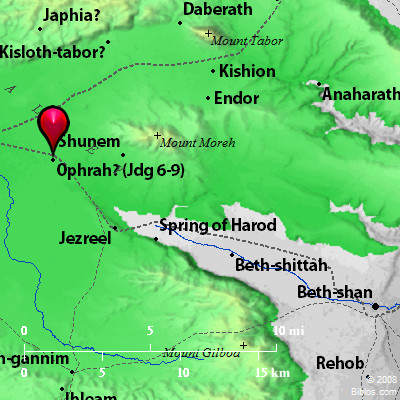Atlas  Ophrah 2 and surrounding area
Maps Created using Biblemapper 3.0Additional data from OpenBible.infoOccurrences Judges 6:7 It happened, when the children of Israel cried to Yahweh because of Midian, Judges 6:11 The angel of Yahweh came, and sat under the oak which was in Ophrah, that pertained to Joash the Abiezrite: and his son Gideon was beating out wheat in the winepress, to hide it from the Midianites. Judges 6:24 Then Gideon built an altar there to Yahweh, and called it " Yahweh is Peace." To this day it is still in Ophrah of the Abiezrites. Judges 8:27 Gideon made an ephod of it, and put it in his city, even in Ophrah: and all Israel played the prostitute after it there; and it became a snare to Gideon, and to his house. Judges 8:32 Gideon the son of Joash died in a good old age, and was buried in the tomb of Joash his father, in Ophrah of the Abiezrites. Judges 9:5 He went to his father's house at Ophrah, and killed his brothers the sons of Jerubbaal, being seventy persons, on one stone: but Jotham the youngest son of Jerubbaal was left; for he hid himself. Encyclopedia OPHRAHof'-ra (`ophrah; Codex Vaticanus Aphra; Codex Alexandrinus Iephratha, etc.):
(1) A town in the territory allotted to Benjamin named between Parah and Chephar-ammoni (Joshua 18:23). It is mentioned again in 1 Samuel 13:17. The Philistines who were encamped at Michmash sent out marauding bands, one of which went westward, another eastward, down "the valley of Zeboim toward the wilderness"; the third "turned unto the way that leadeth to Ophrah, unto the land of Shual." This must have been northward, as Saul commanded the passage to the South. Eusebius, Onomasticon places it 5 Roman miles East of Bethel. A site which comes near to fulfilling these conditions is eT-Taiyebeh, which stands on a conical hill some 5 miles Northeast of Beitin. This is possibly identical with "Ephron" (2 Chronicles 13:19), and "Ephraim" (Jn. 11:54).
(2) A city in the tribal lot of Manasseh West of Jordan. It is mentioned only in connection with Gideon, whose native place it was, and with his son Abimelech (Judges 6:11, etc.). It was, indeed, family property, belonging to Joash the Abiezrite, the father of Gideon. It was apparently not far from the plain of Esdraelon (Judges 6:33 f), so that Gideon and his kinsmen smarted under the near presence of the oppressing Midianites. Manasseh, of course, as bordering on the southern edge of the plain, was in close touch with the invaders. At Ophrah, Gideon reared his altar to Yahweh, and made thorough cleansing of the instruments of idolatry. After his great victory, he set up here the golden ephod made from the spoils of the enemy, which proved a snare to himself and to his house (Judges 8:27). Here he was finally laid to rest. It was at Ophrah that Abimelech, aspiring to the kingdom, put to death upon one stone three score and ten of his brethren, as possible rivals, Jotham alone escaping alive (Judges 9:5). Apparently the mother of Abimelech belonged to Shechem; this established a relationship with that town, his connection with which does not therefore mean that Ophrah was near it.
No quite satisfactory identification has yet been suggested. Conder (PEFS, 1876, 1971) quotes the Samaritan Chronicle as identifying Ferata, which is 6 miles West of Nablus, with an ancient Ophra, "and the one that suggests itself as most probably identical is Ophrah of the Abiezerite." But this seems too far to the South.
(3) A man of the tribe of Judah, son of Meonothai (1 Chronicles 4:14).
W. Ewing |




